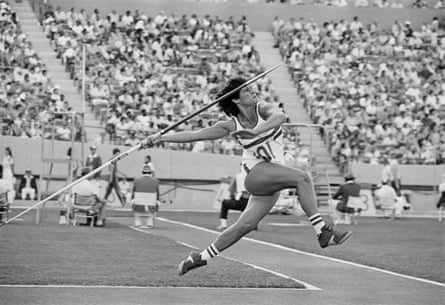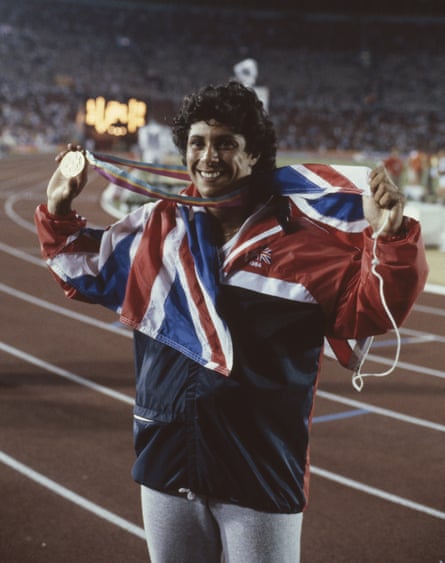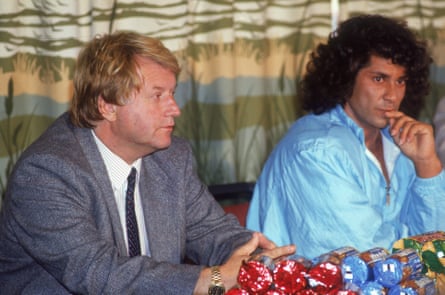In the latest of the many lives of Fatima Whitbread, the former champion javelin thrower has become a formidable reality TV star – and it suits her. She is surely one good show away from “beloved” status, which might prove to be the I’m a Celebrity … Get Me Out of Here! spin-off in which she is soon to star, alongside a select group of other former participants in the ITV show.
She was on I’m a Celeb in 2011, when her nasal cavity became home to a cockroach during one of the challenges – “There’s definitely something wriggling about in there!” – and it took an hour for the camp doctor to flush it out. But I liked her best in last year’s Celebrity SAS: Who Dares Wins, the Channel 4 series in which celebs do Special Forces training; Whitbread cracked three ribs jumping out of a helicopter, but kept it a secret because she didn’t want to leave the show. She was charming, warm, capable and – having filmed it at 60 – ripped.
This morning, she has been out exercising for two hours. She does an hour of cardio or weights every day. Even her jack russell terrier, Bertie, is ageing well; the vet remarked recently on his good health. “They said he’s got a heartbeat like an athlete,” says Whitbread, smiling. That is what you get when you are owned by an Olympic medallist and former world champion who once broke the women’s javelin world record. Bertie sits between us on a large sofa in Whitbread’s spotless, clutter-free home in Essex. The only hint at the greatness of her sporting career is a bronze cast of her hand, strong fingers wrapped around a javelin’s grip, given to her by Madame Tussauds.
Whitbread, 62, has led an extraordinary life. This decade has been defined so far by physical and psychological challenges. Last year, as well as the SAS show, she climbed Mont Blanc. About a year ago, for the first time, she started having therapy (even when she had a breakdown in her 20s, she powered through without professional help). “I’ve realised I’ve done bloody marvellous without it, but sometimes things trigger and all those childhood years can come back to haunt you,” she says.
As a baby, Whitbread was abandoned in a flat in London and essentially left to die. After hearing her cries, neighbours called the police. Whitbread recovered in hospital from malnutrition, dehydration and her terrible physical condition, then spent her childhood in children’s homes. “I felt this deep sense of loss within me,” she says. When she was five, she was introduced to her biological mother – having had no idea of her history – and moved to a children’s home in Essex, where she had two half-siblings. “That was the first time I started questioning what was going on in my life and what was to become of me.”
It was a life of deprivation, physical and emotional. There wasn’t enough food and they had few clothes. The children played in a cold garage with a concrete floor. Love and affection were scant. She was abandoned again and again. Occasionally, her biological mother would arrive to take her half-siblings home for a visit, but not Whitbread. Once, the woman she calls “the biological mother”, never “my biological mother” – a Turkish Cypriot woman who spoke almost no English – did take her, but changed her mind and sent her back to the home.

Whitbread’s biological father, a Greek Cypriot, also surfaced. She spent a week with him, with the promise that he would be back to collect her again the weekend after, but he didn’t appear. “I sat on the front wall for a whole weekend,” she says. “The second weekend, I did the same thing. I think that cracked me, emotionally. I put these walls up around myself to secure me.”
The only person who showed Whitbread any love was a woman who worked in the home, known as Auntie Rae. It was Rae who stopped Whitbread’s biological mother, who arrived one day with three men, from taking her out of the home. Rae’s suspicions proved horrifyingly true: at a later date, when her biological mother was able to take her to London for a while, 11-year-old Whitbread was raped by a man who was staying at the flat.
Back at the children’s home and traumatised, Whitbread refused to go to school. “I just became withdrawn. Having not spoken to anyone about it, I felt ashamed, dirty.” Eventually, she told Rae what had happened. Whitbread says it was reported, but nothing was done (she was referred to a child psychologist for a couple of weeks). “Unbelievable what went on back then. You were never taken seriously. We had a social worker and I would talk to him about it. Nothing ever happened. Nobody took notice of the kids.”
Is she angry at the system that failed her so spectacularly? “Well, it does make me …” She pauses. “Even today, some of the crazy policies – ousting kids [from care] at 16 is appalling. My son still lives at home; he’s 25. At 16, these are vulnerable kids.” At present, councils are allowed to put 16- and 17-year-old children in unregulated accommodation, although a ban on the practice will come into force in October. “For a lot of young kids, history starts repeating itself: they start getting in trouble, or offending, and it costs the state a whole lot more. These young kids need that support, because once they get out there they’re easily preyed upon. They’re still kids.”
She worries about the cost of living crisis, inequality and poverty: “The kids are the ones that are getting the damage done.”
Sport saved her, she says. “It gave me a sense of freedom, forgetting all the problems that were going on in the home and the life we were living. It gave me a sense of achievement, that here was something I was good at. I got validation from my PE teachers and my school friends and started to realise life was a bit more positive. I realised that this could be my way out.”
Whitbread became the school netball captain and started going to a local athletics club. The javelin coach, Margaret Whitbread, recognised her talent. When she found out Whitbread lived in a children’s home, she gave her some secondhand boots and a javelin. When Whitbread was grounded for a month, she managed to get a note to Margaret, fearing the coach would think she had left. She wrote that she hoped Margaret would take her back and that she intended to become the best javelin thrower in the world. “It was the start of a dream,” says Whitbread.

Margaret and her husband eventually fostered Whitbread, who changed her surname, Vedad, by deed poll. At 14, she finally had a family, which included the Whitbreads’ two young sons. “That was amazing, the best thing that happened, to be a part of a family, which I’d always wanted,” she says. “It wasn’t straightforward, because all families have their problems. Both as mum and daughter and athlete and coach, we worked it out somehow – and we conquered the world.”
Whitbread began training hard. “I started taking more responsibility for myself,” she says. “You have a whole lot of people that help you, but I’ve got to get myself out at 5am, down the gym, three times a day training, seven days a week.” She trained in a wooden shed at the bottom of the garden of a family friend. She smiles when she talks about how different facilities are now: “I wouldn’t have had it any other way. I loved every minute of it.”
Just two years later, in 1979, Whitbread was crowned European junior champion – becoming the first British woman to hold the title. At less than 1.65 metres (5ft 5in) tall, she wasn’t built like a champion javelin thrower, but what she lacked in reach she made up for in determination: “I had little room to manoeuvre where making mistakes was concerned, so I had to work exceptionally hard at analysing everybody’s techniques and working out the best for me.”
What made her a good – at one stage, the best – thrower? “I think the inner strength that I created as a child. If you asked me: ‘Would I change anything about my life?’ I’d say no, because that created who I am. I had steely inner strength and a sense of determination to succeed because of my childhood. I possibly wouldn’t have had that otherwise.” She pauses. “There are some things you would have wanted to change.”
Whitbread had an incredible career – she was European and world champion and won bronze and silver at the 1984 and 1988 Olympics respectively. In 1986, she broke the world record with a throw of 77.44m. “That was a monumental experience,” says Whitbread. As she let go of the javelin, she knew it was a good throw. “The hours and hours and hours of work that you put in, in order to get everything to click at the right time on the right day …”
People told her it was the wrong day – it was the qualifying round for the European championships, so she had to go back and do it again. “I just thought: I’ll give it 100% and see what happens. I never allowed all that talk to get into there,” she says, pointing at her head. “I kept my mindset focused.” She didn’t manage to break her own record, but threw well enough to take gold.
Much was made of her rivalry with the other British champion javelin thrower, Tessa Sanderson, who won the gold medal at the 1984 Olympics (Whitbread took bronze). “Between us, we achieved everything you could in an event. That’s quite an astounding achievement for a country that wasn’t known for its power events, so Tessa and I really flew that flag.”

The rivalry was real – although Whitbread says her main rival was East Germany’s Petra Felke – but the media amped it up. Sanderson, who is a few years older, had been Whitbread’s idol. Whitbread says she would have liked to have been friends. “I thought there’s nothing better than to be able to have a good friendship in an event where you can pull together. But everyone’s different, aren’t they? The media, what they instigated, it didn’t lend itself very well [to friendship].”
Whitbread was aware of the comments in the media about her muscular physique. Did she care about that? “It’s tools for the job,” she says of her body. Had she been taller, maybe her muscles wouldn’t have been so noticeable, but she was “stubby”, she says, laughing. “But I didn’t care, because I loved what I did and that’s what it took for me to succeed. I didn’t take notice; I was just proud of my work ethos. But sometimes they could be unkind.”
As a child in the 80s, I say, I loved watching Whitbread and Sanderson – so strong and powerful, like warrior goddesses. She smiles: “I think there were a lot of people who felt like that.”
Her success brought fame – and intrusion. The tabloids found her biological mother. The trauma resurfaced. “It forced me to have to tell my story. That was really the start of the demise in my athletic career, because it brought me to a physical and mental breakdown.” While training for the 1988 Olympics, she was also writing a book about her childhood, to try to get control of her story. “It was awful. I shouldn’t have gone to that Olympics, but I managed to pull on all my reserves and I came away with the silver medal.”
In the run-up, when she should have been training hard, she lost “all sense of time. My procrastination was terrible. When I was throwing, it was all over the place – 30 metres, 40 metres, 70 metres.”
A shoulder injury, made worse by Whitbread’s inability to train properly, ended her career officially in 1992. “It was eight years short, really,” she says. “It was a big loss. For three or four years after that, when I went to championships, I would be watching with sadness, because I probably would still have been out there, winning.”
She had wanted more gold medals, including an Olympic one, and was aiming to throw more than 80m: “I think I could have done.” But it wasn’t about the medals, she says. “The sense of loss, of identity and purpose, and then having to reinvent yourself in something that fills that void and the passion you had, is very hard.” She went into sports marketing and did coaching and development.

In 1997, she married Andy Norman, the controversial athletics promoter, with whom she had a son, Ryan, a year later. (Norman had been implicated by the coroner in the 1994 suicide of Cliff Temple, a Sunday Times journalist who had been investigating Norman’s conduct as promotions officer of the British Athletics Federation.) After her traumatic childhood, she was determined that her son’s would be different. “I felt I would be a good mum,” she says. “I believed in myself. It was important for me to be able to prove that I could be a good mum and break the mould of what I’d been through.”
She and Norman had experienced years of infertility, followed by a miscarriage, before their son was born via a third round of IVF. Norman left her for another athlete when Ryan was small, although he and Whitbread managed to remain close. Then, in 2007, he died suddenly, leaving Whitbread to raise Ryan alone. On top of that, it emerged that Norman had taken out loans, partly in Whitbread’s name, which put her tens of thousands of pounds in debt. She had to sell the family home. The fees from reality TV kept her afloat and helped her rebuild her profile.
She seems content, although a long friendship ended recently, which has saddened her: “It’s not until something goes wrong in your life that everything else starts to come back and chase you.” This is why she will stick at the therapy – she has found some kind of acceptance. The older she has got, she says, the more she has realised that “life is about absorbing the good and the bad, learning from both and still moving forward”. She made a choice, she says, not to feel angry or bitter. “That’s only damaging to yourself. It blurs your vision, it doesn’t allow you to progress. When I go back and talk to the five-year-old or the 11-year-old Fatima, I take her by the hand and say: don’t worry, I’ve got you now.”

